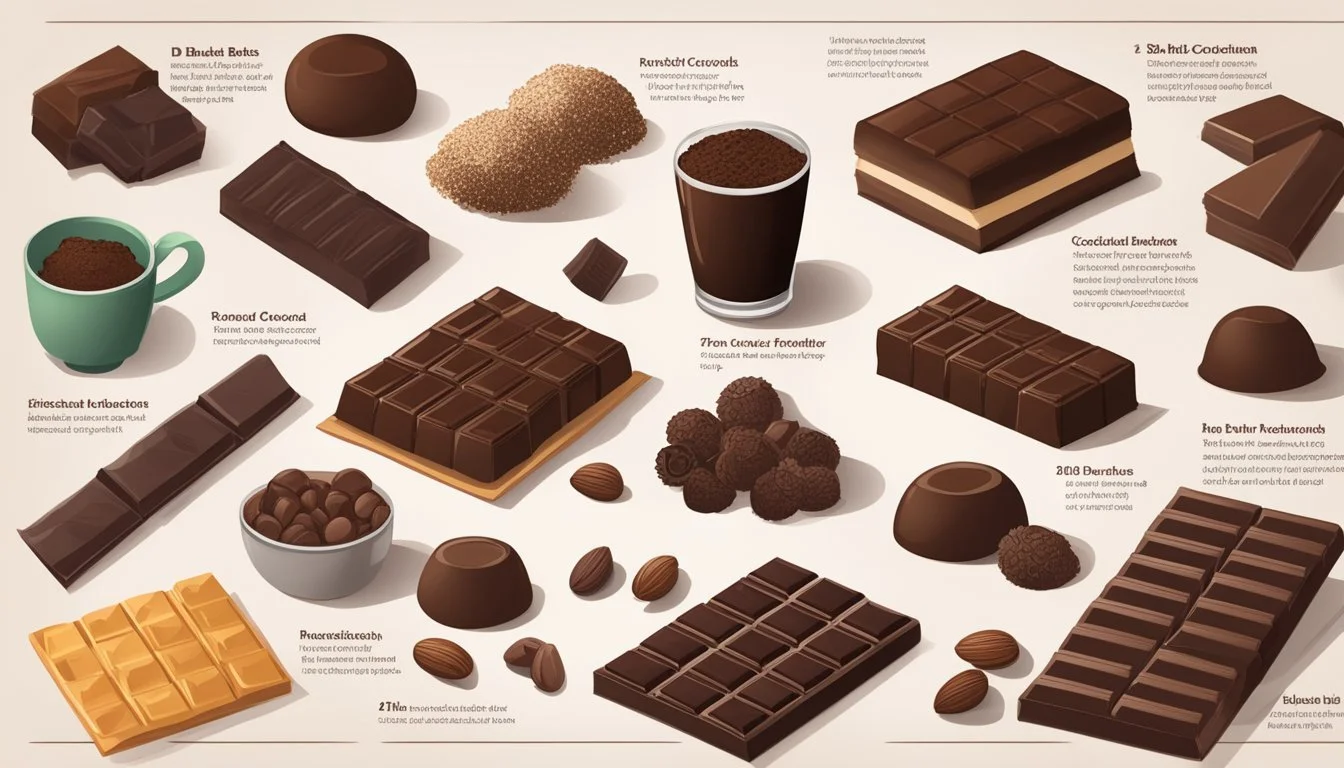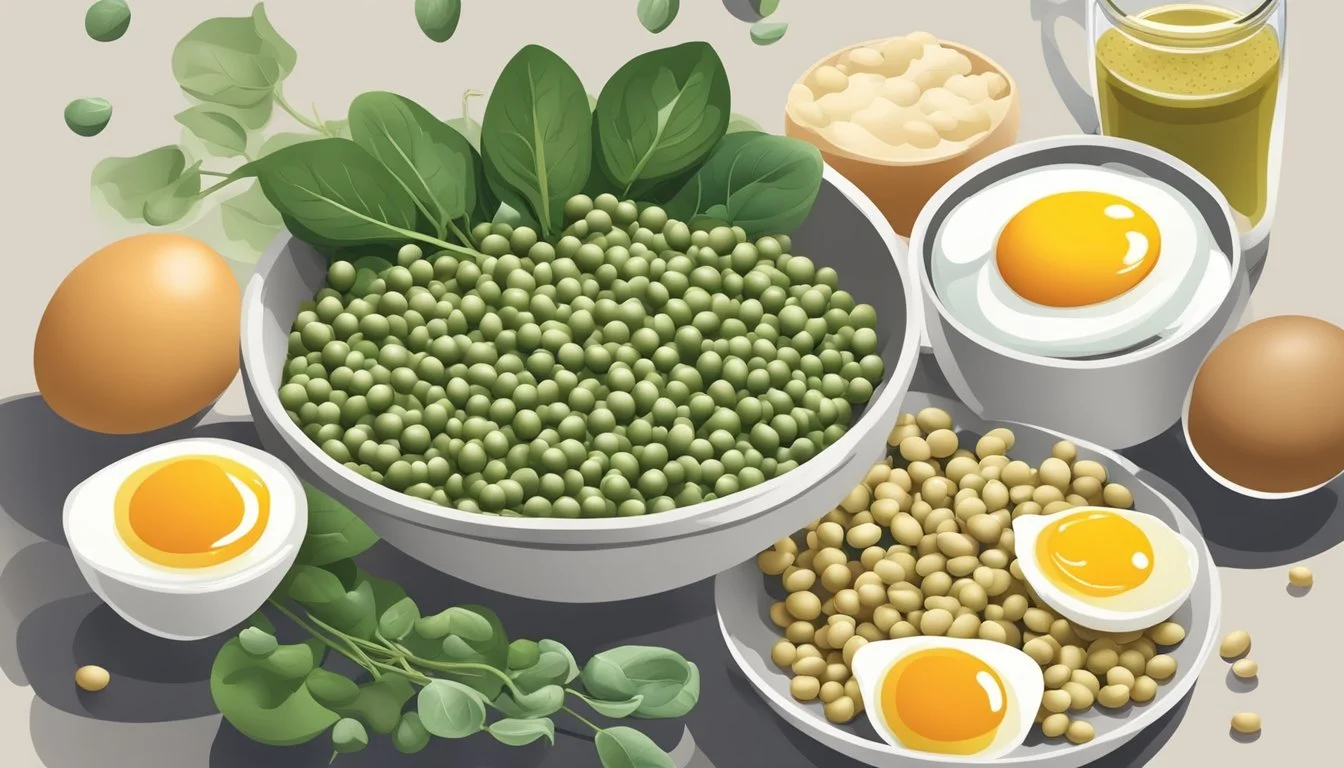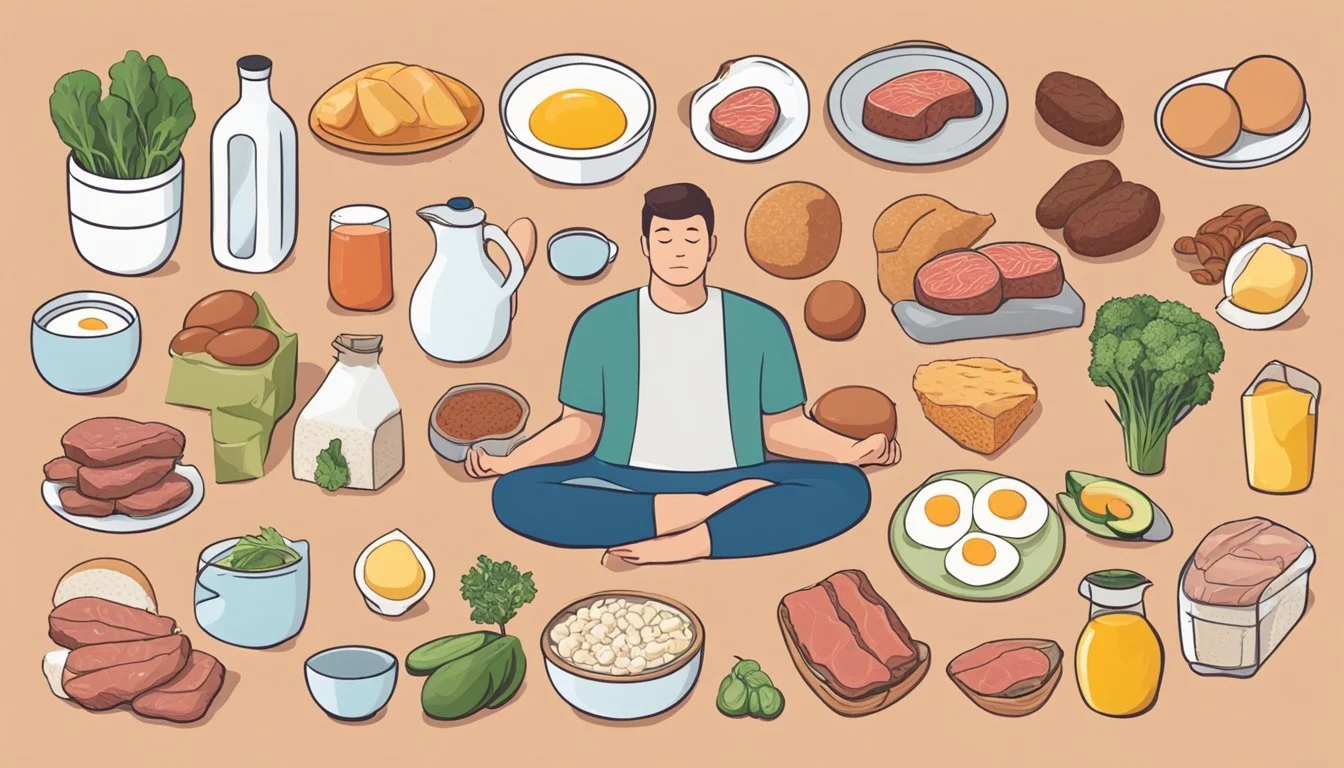Foods That Increase DHT Levels
What to Avoid for Healthy Hair
Understanding the impact of diet on health and wellness is crucial, especially when it comes to hair loss. Among the numerous factors contributing to hair loss, dihydrotestosterone (DHT) plays a significant role by shrinking hair follicles. By incorporating certain foods into your diet, it may be possible to manage DHT levels and promote hair growth.
Diet modifications can offer a natural approach to controlling DHT, which is why exploring foods high in DHT-blocking properties is important. This article will guide you through the significance of these foods and how they can be a part of an effective strategy to maintain healthy hair.
1) Red Meat
Red meat is known for its potential to boost DHT levels due to its rich content of creatine, zinc, iron, vitamin B6, and selenium. These nutrients play a role in various bodily functions, including hormone production.
Creatine is particularly notable, with approximately 350mg per 100g of red meat. To achieve a significant intake, one would need to consume a considerable amount of meat.
Zinc, another critical component found in red meat, aids the body's enzyme functions, including those involved in testosterone metabolism. Higher testosterone can lead to increased DHT levels.
Iron and vitamin B6 also contribute to hormonal health, which can potentially influence DHT production. Additionally, selenium plays a protective role in overall cellular health.
While red meat can be a part of a diet aimed at boosting DHT, it is essential to balance intake with other health considerations. Disproportionate consumption may lead to other health issues, so moderation and dietary variety are crucial.
2) Dark Chocolate
Dark chocolate contains various nutrients that may support overall hair health. It is a rich source of zinc, which has been shown to inhibit the enzyme 5-alpha reductase. This enzyme converts testosterone into dihydrotestosterone (DHT), a hormone linked to hair loss.
The antioxidants in dark chocolate, such as flavonoids, also contribute to scalp health. These antioxidants help reduce inflammation and improve blood circulation. This increased blood flow may promote healthier hair follicles.
Additionally, dark chocolate provides magnesium, a mineral that plays a critical role in hormone regulation. Magnesium deficiencies can lead to higher DHT levels.
Including dark chocolate in a balanced diet might be a tasty way to support hair health. However, moderation is key due to its calorie content.
3) Egg Yolks
Egg yolks are rich in biotin, a B-vitamin crucial for hair health. Biotin deficiency can lead to hair loss, making egg yolks a valuable addition to a diet focused on supporting hair growth.
Egg yolks also contain essential fatty acids. These acids can help nourish hair follicles, promoting healthier and stronger hair growth.
Additionally, egg yolks provide other hair-beneficial nutrients like vitamins A, D, and E. These vitamins contribute to maintaining the health of the scalp and hair follicles.
Egg yolks are a source of high-quality protein, necessary for the structure of hair strands. Incorporating them into meals can help ensure the body has the building blocks needed for robust hair.
4) Oysters
Oysters are known for their high nutritional value, being particularly rich in zinc. This mineral plays a critical role in blocking DHT, a hormone that contributes to hair loss.
Zinc in oysters not only inhibits the production of DHT but also supports overall scalp and hair health by aiding in cell reproduction and tissue growth.
Additionally, oysters contain other beneficial nutrients such as magnesium and potassium. Magnesium helps improve blood flow, which is essential for delivering nutrients to the hair follicles.
Potassium further supports this process, ensuring the hair follicles receive adequate nourishment. This combination of minerals makes oysters an excellent food choice for those looking to mitigate hair loss naturally.
Including oysters in one's diet can contribute significantly to maintaining healthy hair growth by addressing the hormonal and nutritional aspects of hair loss.
The unique blend of minerals found in oysters offers a natural and effective approach to managing DHT levels and promoting hair health.
5) Cashews
Cashews are a popular nut known for their rich, creamy texture and versatile use in various dishes. They are packed with nutrients that may support hair health and help inhibit the production of DHT (dihydrotestosterone), a hormone linked to hair loss.
One significant component found in cashews is zinc. Zinc plays a crucial role in hair tissue growth and repair. Sufficient zinc intake might contribute to balancing hormone levels, which can potentially reduce DHT production.
Cashews also contain magnesium, which supports numerous bodily functions, including enzymatic reactions. Magnesium may help prevent the buildup of calcium on hair follicles, ensuring healthier hair growth environments.
Rich in antioxidants like vitamin E, cashews can mitigate oxidative stress on scalp cells. This can further promote a healthy scalp environment essential for robust hair growth.
Additionally, the presence of healthy fats in cashews helps to maintain the lipid barriers of the scalp. This keeps the hair follicles nourished and hydrated.
A good source of biotin, dietary intake of cashews may support keratin production, crucial for strong hair structure. Incorporating cashews into meals or as a snack can be a practical way to benefit from their hair-supportive properties.
6) Pumpkin Seeds
Pumpkin seeds are a rich source of zinc. This mineral plays a crucial role in inhibiting the production of dihydrotestosterone (DHT), a hormone closely associated with hair loss.
These seeds also contain a rare amino acid called cucurbitin. Cucurbitin has been studied for its potential to block DHT and support hair growth.
Packed with antioxidants and healthy fats, pumpkin seeds can contribute to overall scalp health. Including them in one's diet might help in maintaining hair density.
7) Peanuts
Peanuts are a potent source of essential nutrients that may help to inhibit DHT production. They are rich in biotin, which plays a crucial role in maintaining healthy hair. Biotin, a B-vitamin, can prevent hair thinning by neutralizing the effects of DHT on hair follicles.
Peanuts also contain significant levels of folate and molybdenum, which contribute to overall hair health. These nutrients support cellular function and repair, creating an environment conducive to hair growth.
Additionally, peanuts provide a high protein content, another key element for hair strength and growth. Proteins are vital for the production of keratin, the primary structural component of hair.
Including peanuts in your diet can be a simple yet effective way to support hair health. Moderation is key, as peanuts are also calorie-dense and should be consumed as part of a balanced diet.
8) Soybeans
Soybeans are a valuable addition to any diet aimed at managing DHT levels. Known for their rich nutrient profile, soybeans contain isoflavones. Isoflavones are compounds that can inhibit the production of dihydrotestosterone (DHT), a hormone associated with hair loss.
Soybeans, available in various forms such as edamame, tofu, and soy milk, are versatile and easy to incorporate into meals. These foods provide protein, fiber, and essential vitamins.
A study involving 58 males demonstrated that consuming soy protein high in isoflavones showed promising results in reducing DHT production. Isoflavones from soy may interfere with enzymes that convert testosterone to DHT, thereby supporting hair health.
9) Cheddar Cheese
Cheddar cheese is a widely enjoyed dairy product known for its rich flavor and various textures. It comes in varieties like mild, sharp, and extra-sharp, catering to different palate preferences.
Cheddar, especially aged cheddar, is a good source of several nutrients. It contains significant amounts of protein, calcium, and vitamin D, which are beneficial for overall health.
Low in lactose, aged cheddar is generally well-tolerated by individuals with lactose intolerance.
Although cheddar cheese is nutritious, it's important to consume it in moderation due to its high saturated fat and calorie content. This cheese can be an indulgent addition to a diet, but balancing it with other nutrient-rich foods is crucial.
10) Spinach
Spinach is a powerful ally in the fight against DHT-related hair loss. Rich in essential nutrients like iron and magnesium, it promotes overall scalp health.
It contains high levels of zinc and vitamins A and C, which support hair follicle function. These nutrients help in reducing the production of DHT.
Spinach is also packed with antioxidants, such as lutein and zeaxanthin, that improve overall hair health. Regular consumption of spinach can strengthen hair from the roots.
Understanding DHT
DHT, a potent androgen, plays significant roles in the body, particularly influencing hair and skin health. It is derived from testosterone and closely linked to hair loss and certain skin conditions.
What Is DHT?
DHT stands for Dihydrotestosterone, a hormone synthesized from testosterone. It is primarily produced in the prostate, testes, and certain tissue, including hair follicles and skin.
DHT is considered more potent than testosterone due to its stronger binding affinity to androgen receptors. This increased potency makes it a critical player in various bodily processes.
DHT formation occurs via the enzyme 5-alpha-reductase, which converts testosterone into DHT. Elevated levels of DHT have been associated with conditions like androgenetic alopecia (pattern hair loss) and benign prostatic hyperplasia.
Role of DHT in the Body
DHT is essential in male development, particularly during fetal development and puberty. It is responsible for forming male genitalia and contributes to secondary male characteristics, such as deeper voice and facial hair growth.
In adults, DHT helps maintain muscle mass and supports sexual health. It also influences sebaceous gland activity, which affects skin oil production.
While DHT serves essential functions, its regulation is critical. Excessive DHT can contribute to prostate enlargement and other health issues, highlighting the importance of balanced hormone levels in the body.
Effects of DHT on Hair and Skin
DHT adversely affects hair follicles by binding to androgen receptors, shrinking hair follicles, and shortening their growth cycle. This leads to thinner hair and eventually, hair loss, particularly in genetically predisposed individuals.
Hair loss due to DHT commonly affects the scalp in a pattern known as androgenetic alopecia. Methods to counteract this process include using DHT blockers, like certain foods and medications.
DHT also impacts skin health by increasing oil production, which can lead to acne. Understanding DHT's role can help manage conditions like hair loss and skin problems more effectively.
Dietary Impact on DHT Levels
Nutrition plays a crucial role in regulating DHT (dihydrotestosterone) levels, impacting various aspects of health, including hair growth and metabolic functions. Certain foods can either boost or inhibit DHT production, affecting hormonal balance.
How Nutrition Affects DHT
Insulinogenic foods, like rice and sweet potatoes, boost insulin and IGF-1, which may elevate DHT production. Men consuming more carbohydrates have higher DHT compared to those on low-carb diets. This relationship highlights how dietary choices can influence hormonal levels.
Additionally, certain compounds in foods regulate enzymes that control DHT levels. For example, zinc-rich foods contribute to enzyme activity crucial for DHT production. Conversely, foods containing polyphenols like green tea may inhibit DHT, offering a natural way to manage its levels.
Nutritional Strategies for Managing DHT
To manage DHT levels, consider incorporating specific foods known to influence its production. Foods rich in DHEA (like fatty fish) can increase DHT, aiding people with low testosterone. Meanwhile, reducing intake of high-carb diets may help those seeking lower DHT.
For those aiming to block DHT to prevent hair loss, adding green tea and coconut oil to the diet could be beneficial. Green tea contains EGCG, a compound that blocks DHT's harmful effects on hair follicles. Coconut oil, with its anti-androgenic properties, further supports hair health.
Using a balanced approach to nutrition can help in either boosting or inhibiting DHT as needed.
Balancing DHT Through Lifestyle Changes
Balancing DHT levels involves a combination of dietary choices, effective stress management, and regular exercise. These lifestyle changes can optimize hormonal health and contribute to overall well-being.
Incorporating a Balanced Diet
Eating a balanced diet rich in specific nutrients can influence DHT levels. Incorporate carbohydrates like rice, sweet potatoes, and corn for their insulin-boosting properties, which can enhance DHT production. Additionally, foods high in healthy fats, such as avocados and nuts, are crucial for hormone synthesis.
Moderate protein intake is also important. Lean meats, fish, and beans provide the necessary amino acids for optimal hormonal function. Stay hydrated and ensure you get a mix of vitamins and minerals from fruits and vegetables to support endocrine health.
Stress Management and Its Effects on Hormones
Chronic stress can disrupt hormone balance, leading to irregularities in DHT production. Practicing mindfulness techniques like meditation or yoga can help reduce stress levels. Regular deep-breathing exercises and ensuring adequate sleep are also beneficial.
Maintaining a manageable daily schedule and taking breaks can prevent stress accumulation. Engage in hobbies or activities that promote relaxation and mental well-being. Consistent relaxation practices lead to a more balanced hormonal environment.
Exercise and Hormonal Balance
Exercise plays a pivotal role in regulating DHT and other hormones. Resistance training, such as weightlifting, helps increase testosterone and subsequently DHT levels. High-Intensity Interval Training (HIIT) is effective in boosting overall hormonal health.
Engaging in regular physical activities like walking, running, or cycling helps maintain a healthy body weight, which is essential for hormone balance. Exercise also reduces stress hormones like cortisol, which can negatively impact DHT production. Consistency in these activities ensures sustainable hormonal health benefits.






